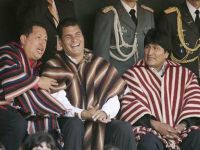Chavez, Morales, Correa: Latin American power trio
 By Olivia Kroth
By Olivia Kroth
As a socialist tide sweeps the Latin American continent, three outstanding leaders of the New Left have emerged, the power trio of Venezuela's Hugo Chavez, Bolivia's Evo Morales and Rafael Correa in Ecuador.
They promote and implement 21st century socialism in their respective countries which show quite a few common traits, in spite of economic, geographic, historic and political differences. All three presidents were elected with an absolute majority of votes and hold majorities in congress which facilitates change and reforms. Their parties have become mass movements supporting them.
Hugo Chavez is the leader of PSUV (Partido Socialista Unido de Venezuela), Evo Morales heads MAS (Movimiento al Socialismo) in Bolivia, and Rafael Correa's party in Ecuador is Allianza Pais (Patria Altiva y Soberana). In their politics, the three leaders encourage social programs, grassroots and community projects, popular mobilization and direct participation on a mass scale.
Twenty-first century socialism in Latin America is founded on strong moral and ethical principles such as fraternity and solidarity. One of Hugo Chavez's favorite sayings is,"The world needs a new moral architecture."
Rafael Correa said (2009), "Socialism will continue. The Ecuadorian people voted for that. We are going to emphasize this fight for social justice, for regional justice ... and human work over capital. Nobody is in any doubt that our preferential option is for the poorest people, we are here because of them."
Socialism in Bolivia, Ecuador and Venezuela features a strong patriotic component, inspired by the historical experience of fighting for liberty against the Spanish invaders. Simon Bolivar - El Libertador - has become a common national symbol.
Remembering the battles against Spanish colonialism is deeply rooted in the nations of Bolivia, Ecuador and Venezuela. Especially the indigenous movements see themselves as inheritors of their ancestors' struggles for freedom from the yoke of Spanish occupation and exploitation.
It is no coincidence that the three presidents have indigenous roots. Hugo Chavez, born July 28, 1954 into a working class family in Sabaneta, Venezuela, is of Amerindian and Afro-Venezuelan origin. As president, he has introduced many programs to involve the indigenous population in Venezuelan politics. Besides many small tribes, the main indigenous populations are the Wayuu in the west, the Warao in the Orinoco Delta and the Pemon in the southern grasslands, known as La Gran Sabana.
Evo Morales, born October 26, 1959 in Isallawi, Bolivia, stems from a working class Aymara family. When he was sworn in as president in 2006. He attended an Aymara ceremony at Tiwonaku before a crowd of thousands of Aymara people, a highly symbolic ritual.
The Aymara have been living for over 2.000 years in the part of the Andes which is called Bolivia today. Their capital city was Tiwanaku, founded in 1,500 BC, now a renowned archeological site. Aymara and Quechua are official languages in Bolivia besides Spanish. Thirty percent of the Bolivian population is Quechua-speaking, 25% is Aymara-speaking. 2.5 million Quechua and 2 million Aymara live in Bolivia.
Rafael Correa, born April 6, 1963 into a working class family of Guyaquil, Ecuador, grew up learning Quechua and communicates with Ecuador's indigenous population in their own language.
Socialism in Bolivia, Ecuador and Venezuela is based on the indigenous heritage of collectivism. Private property was unknown, in some instances property inheritance was forbidden. The indigenous population shared a communitarian ideal.
Most natural resources have been nationalized: oil, gas and lithium. Venezuela owns the largest oil reserves worldwide, while Bolivia's position is strengthened by the knowledge that its hydrocarbon assets are highly valued. Bolivia has the second largest natural gas reserves in Latin America and 5.4 million cubic tonnes of lithium, which represents about 70% of the world's reserves. Ecuador has also nationalized its oil reserves.
Chavez, Morales and Correa are charismatic leaders who have gained global admiration and support. They favor a multi-polar world, anti-imperialism and anti-capitalism. They share strong ties to other Latin American countries, Cuba, China, Russia and Iran.
Latin American strength is founded on unification. Chavez, Morales and Correa are fiery champions of ALBA (Alliance for the Peoples of our America), UNASUR (Union of South American Nations) and the newly created CELAC (Community of Latin American and Caribbean States). Latin America has its own virtual currency, the SUCRE, and its own regional bank, BANCO DEL SUR.
With Chavez, Morales and Correa as champions of unification, the continent may well be on its way to become "The United States of Latin America" in the near future.
Prepared for publication by:
Lisa Karpova
Pravda.Ru
Subscribe to Pravda.Ru Telegram channel, Facebook, RSS!




